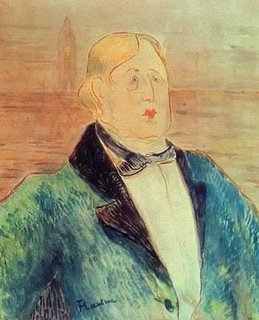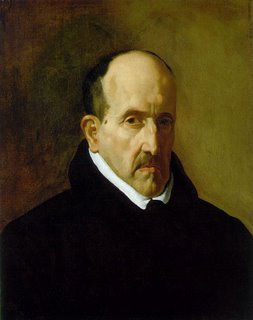

CURZON vs. WILDE
A Confrade da Bomba, traz hoje um apontamento wildeano, que me lembra outro, saboroso, bem sugestivo do ambiente e do espírito da época:
“…The Crabbet was founded by Sir Wilfrid Scawen Blunt, the satyric traveller, poet and campaigner for Irish and Egyptian nationalism. Although he modelled himself on Byron (whose granddaughter he married) he was, like his cousin George Wyndham, a man whose talents were too diffuse for him to achieve a great deal in any field, and the principal triumphs of his life were philanderous. While he despised the Souls as a group, he liked them enough as individuals to attempt, with varying degrees of success, the seduction of their women, and to invite some of their men to the annual weekend of the Crabbet Club at his Sussex home. The club's purpose, as defined by Wyndham, was 'to play lawn tennis, the piano, the fool and other instruments of gaiety', but the chief event of the weekend was the yearly poetry competition.
Although he was nearly twenty years younger than Blunt and disagreed with most of his political views, Curzon was an enthusiastic member of the Crabbet Club. He liked his host but regarded him as an 'incorrigible charlatan' and once, after encountering him in Egypt, wrote in his diary: 'My dear Wilfrid, your poetry is delightful and your morals, though deplorable, enchanting. But why are you a traitor to your country?' Curzon was elected to the club in 1891 at the same time as Oscar Wilde, and his 'diablerie" immediately got the better of him. Appointed to the role of 'devil's advocate' to oppose Wilde's candidature, Curzon embarked on a clever, amusing and unkind speech about sodomy and the treatment of the subject in The Picture of Dorian Gray. 'Poor Oscar', noted Blunt, 'sat helplessly smiling, a fat mass, in his chair,' but pulled himself together to make a witty reply. To the mingled amusement and embarrassment of the other members, the duel continued long into the night, brilliant and ferocious, recalled Blunt, who doubted 'if anything better was ever heard, even from Disraeli in his best days'. Several years later, when Wilde was in exile and Curzon was Viceroy, the playwright described his antagonist's speech as the height of bad taste and claimed that everyone had roared with laughter at his own. But at the end, he said, Curzon had been charming and apologetic, and the talking had continued until dawn. Then the younger men, including Curzon and Wyndham, had gone for a swim in the lake and afterwards, in Wilde's words, they had begun 'playing lawn tennis, just as they were, stark naked, the future rulers of England'. Blunt's daughter remembered Wilde also playing tennis, “a great wobbly blancmange trying to serve underhand”. He never went to Crabbet again.”
“…The Crabbet was founded by Sir Wilfrid Scawen Blunt, the satyric traveller, poet and campaigner for Irish and Egyptian nationalism. Although he modelled himself on Byron (whose granddaughter he married) he was, like his cousin George Wyndham, a man whose talents were too diffuse for him to achieve a great deal in any field, and the principal triumphs of his life were philanderous. While he despised the Souls as a group, he liked them enough as individuals to attempt, with varying degrees of success, the seduction of their women, and to invite some of their men to the annual weekend of the Crabbet Club at his Sussex home. The club's purpose, as defined by Wyndham, was 'to play lawn tennis, the piano, the fool and other instruments of gaiety', but the chief event of the weekend was the yearly poetry competition.
Although he was nearly twenty years younger than Blunt and disagreed with most of his political views, Curzon was an enthusiastic member of the Crabbet Club. He liked his host but regarded him as an 'incorrigible charlatan' and once, after encountering him in Egypt, wrote in his diary: 'My dear Wilfrid, your poetry is delightful and your morals, though deplorable, enchanting. But why are you a traitor to your country?' Curzon was elected to the club in 1891 at the same time as Oscar Wilde, and his 'diablerie" immediately got the better of him. Appointed to the role of 'devil's advocate' to oppose Wilde's candidature, Curzon embarked on a clever, amusing and unkind speech about sodomy and the treatment of the subject in The Picture of Dorian Gray. 'Poor Oscar', noted Blunt, 'sat helplessly smiling, a fat mass, in his chair,' but pulled himself together to make a witty reply. To the mingled amusement and embarrassment of the other members, the duel continued long into the night, brilliant and ferocious, recalled Blunt, who doubted 'if anything better was ever heard, even from Disraeli in his best days'. Several years later, when Wilde was in exile and Curzon was Viceroy, the playwright described his antagonist's speech as the height of bad taste and claimed that everyone had roared with laughter at his own. But at the end, he said, Curzon had been charming and apologetic, and the talking had continued until dawn. Then the younger men, including Curzon and Wyndham, had gone for a swim in the lake and afterwards, in Wilde's words, they had begun 'playing lawn tennis, just as they were, stark naked, the future rulers of England'. Blunt's daughter remembered Wilde also playing tennis, “a great wobbly blancmange trying to serve underhand”. He never went to Crabbet again.”
David, Gilmour, Curzon.Imperial Statesman, pp. 103-104


<< Home